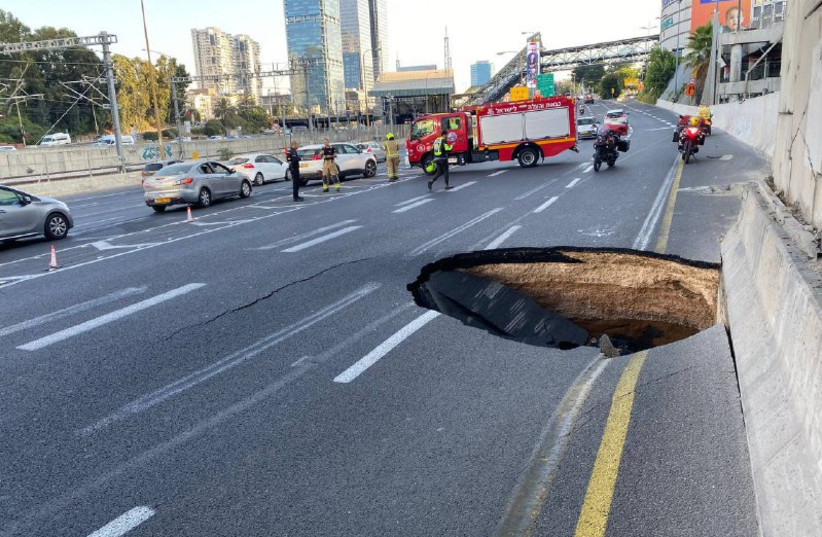Fortunately, nobody was injured when a massive sinkhole suddenly opened up in the middle of Tel Aviv’s Ayalon Highway on Saturday. However, the incident is a sobering reminder of the need for greater safety precautions. Although it is not yet completely clear what caused the sinkhole to appear, it is considered likely to be related to major construction work going on in the area, in which excavation work has diverted subterranean water flow.
The sinkhole, which appeared close to the Hashalom interchange in the southbound direction, caused massive traffic jams as police sealed off many of the lanes and the train service to Tel Aviv stations were temporarily closed.
Recent spate of sinkholes
Last year, part of a parking lot at Jerusalem’s Shaare Zedek Medical Center collapsed due to a sinkhole and three cars fell into the pit. Luckily, in that case too, no one was injured as the vehicles were empty at the time.
Until the Ayalon incident, the most recent case that made headlines was the death in July of 32-year-old Klil Kimhi. He lost his life in a chilling incident when a sinkhole opened up under a swimming pool at a private party in Karmei Yosef, sucking the young man into a subterranean tunnel.
The ongoing investigation in that case indicates that a proper survey of the area would have revealed the problematic caverns and tunnels that contributed to the development of the sinkhole. It also showed that correct maintenance could have prevented the tragedy.

As we noted at the time, many tragedies are not acts of nature, like a fatal lightning strike, but are the result of negligence. Accidents occur because of the Israeli “smoh alai” (“trust me”) mentality, the blind belief that “yehiyeh beseder” – everything will be alright.
In recent years, many sinkholes have opened up in the Dead Sea region as the water level recedes, including on Route 90, Israel’s longest highway. It is sad to think that the country only truly pays attention to the sinkhole phenomenon when it affects the traffic in Tel Aviv. A sinkhole on the road near the Dead Sea is also deadly.
Neglecting safety measures
Similarly, as the country fills with evermore skyscrapers, every care must be taken to ensure that these really are safe and earthquake-proof. There needs to be not only increased supervision over all stages of excavation and construction, but those involved also need to take personal responsibility.
Sadly, the news of construction workers falling to their deaths at sites where the required safety measures have not been implemented has become almost commonplace.
There is a precept in Judaism that anyone who saves a life is considered as having saved the entire world. The obvious concept behind this is the belief that every single life counts and is a world in itself.
The sinkhole on the Ayalon Highway should serve as a wake-up call in general and another reminder that safety is as important as security. Warning signs of a problem muat be heeded. But even before that, utmost care must be taken with planning and implementation of projects, large and small. The government, any government, must ensure that existing regulations are enforced, investment is made in safety inspectors, and follow up with legal procedures is conducted when necessary.
<br>The responsibility of the government
Safety is an essential component of the covenant between a government and its citizens. It does not depend on who heads the government or which party holds the construction, transportation or infrastructure portfolios.
The Dead Sea area is dotted with signs saying “Beware of sinkholes.” This is not a solution. Nobody can seriously consider that erecting “Danger” signs on the main Tel Aviv highway will solve the problem or absolve anyone of responsibility.
Some disasters are waiting to happen. It is immoral to ignore the warning signs and just hope they won’t happen on your watch.
The Ayalon sinkhole symbolizes the problem. It is the visible end-result of a process that started, unseen, before the danger became evident to all. What is happening under the surface also needs to be monitored.
The time to take responsibility is before a disaster takes place, to prevent it, not after yet another avoidable tragedy.
